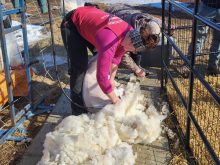Images of poorly managed chickens allegedly from a southern Ontario poultry farm are making news across Canada.
The Canadian Coalition for Farm Animals, a Toronto based animal rights organization, says a University of Guelph biology student entered poultry barns belonging to veterinarian Lloyd Weber and recorded images that the CCFA claims show practices that are “abusive to chickens.”
The Peak, an independent student newspaper, published the anonymous student’s account of seeing nearly featherless birds crowded into dirty cages.
The student said he followed all biosecurity protocols to avoid disease introduction or spread.
Read Also

Charges laid after cattle theft
Saskatchewan RCMP lay two charges against a man after six cattle went missing.
CCFA provided media across the country with images they say came from the barns of LEL Farms.
Poultry experts at the University of Saskatchewan say the images show an older type of barn that is poorly managed but not typical of the chicken and egg industry.
In many cases the images showed birds at the end of their production cycle inside battery cages, with some abrading of feathers. In one of the images it appears the birds were overcrowded. The overall cleanliness of the barn appeared poor.
Two dead birds were also shown, but experts say mortalities are part of any livestock production situation and two dead birds in a barn of 20,000 are not unusual.
Stephanie Brown of CCFA said her organization wants an end to all battery-cage confinement systems like the ones in the photographs circulated by the group. They would prefer that birds be kept in open housing of a type that the European Union intends to make mandatory in its member countries beginning in 2012.
“The birds should have the ability to act naturally, with the ability to dust bathe and such,” she said.
CCFA has asked grocery giant Loblaw Canada to label eggs from battery-cage production as being from confined poultry.
Geoff Wilson of Loblaw Companies Ltd. said his company already provides organic, free range and nutrition enhanced eggs to its consumers and isn’t in the business of labelling products.
“That’s the business of the (Canadian Food Inspection Agency). Consumer demand tells us what to supply.”
Wilson said his company requires all producers that supply Loblaw to follow a code of ethics and best industry practices.
Those practices, says Peter Clark, president of the Canadian Egg Marketing Agency and a Nova Scotia producer, include the Start Clean-Stay Clean program.
“We are concerned that someone broke into a barn to document something. We don’t know if these pictures and video come from the barn in question,” he said.
“CEMA producers have to follow codes of practice. If they don’t, the provincial associations will enforce them. The provincial bodies inspect in most cases a couple of times each year to ensure compliance,” he said.
“Producers that don’t bring their practices in line can have their quota removed,” he said.
Clark said the biggest reason to maintain a clean and healthy flock is productivity.
“There is no money in poor husbandry. The birds don’t produce. The farmer doesn’t make money.”
Barn owner Weber said he would not comment until an Ontario Provincial Police investigation is completed into the barn entry and the allegations against him.
















